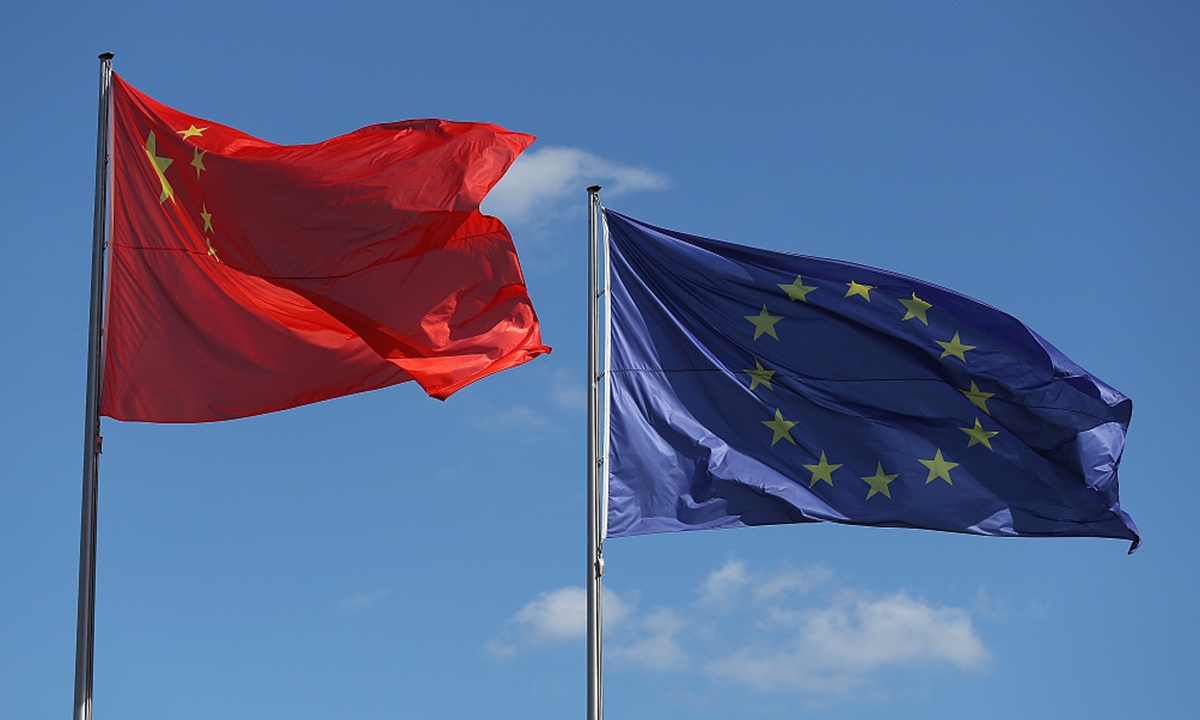China-EU investment treaty breakthrough win-win for global cooperation
Source: Global Times Published: 2020/12/19 21:42:14

China EU Photo:VCG
Seven-year negotiations on bilateral investment treaty between China and the European Union may see breakthroughs by the end of 2020.
"The EU Chamber is very hopeful that the negotiations on the EU-China Comprehensive Agreement on Investment (CAI) can be finalized by a political agreement in the next days," Joerg Wuttke, the president of the European Union Chamber of Commerce in China, told German national news agency Deutsche Presse Agentur on Friday.
Both China and the EU have attached great importance to the negotiations, especially against the backdrop of the COVID-19 pandemic, with progress rapidly pushed forward with rounds of talks. The deal is meaningful to bilateral cooperation and also to China's future economic development.
The talks regarding the CAI are coming to an end and Western media is very curious about specific clauses or content in the deal. Some outlets reported that China will concede or make similar moves to ink the deal. This is partial speculation, as in any negotiation, all sides involved need to make certain necessary compromises to reach a consensus.
The reason why many Western media outlets keep a close eye on the deal is the timing, or we can say regarding its influence on the China-US relationship over the next period. Although Joe Biden's election has been reportedly formalized, he still has not been officially sworn in. Besides, the EU has made gestures to the US, including enhancing collaboration in its dealings with China. But after the CAI has been signed, what will the relationship between the three be like? This is eye-catching.
Under US President Donald Trump's presidency, relations between China, the EU and the US have experienced dark moments. Confrontation won't be a key word for the Biden administration. So, if Biden is willing to remedy the scars left by Trump and restore US' reputation, the three sides would have room to figure out a path leading to positive ties.
After the CAI is signed, there will be more positive trends in terms of China-EU mutual trust and cooperation on investment, economy and trade. The EU and the US are trying to fix their relationship, and if certain contradictions between them are neutralized, it might in turn offer a positive hand to China-US ties.
Chinese State Councilor and Foreign Minister Wang Yi has pointed out that China and the US should "resume dialogue, bring relations back on track and rebuild mutual trust for the next stage of bilateral relations." If the three major economies of the world can come together in such a direction, it will be very conducive.
The signing of the CAI will mean that both sides are willing to strengthen their common interests. In particular, the EU will show its determination to engage in further cooperation with China and allow the two sides to become more closely linked. In this context, the EU will certainly not abandon its cooperation with China and turn to cater to US moves to deal with China.
From this perspective, the CAI could provide a reference to China and the US in their negotiations about issues such as the phase II trade deal. This is what I believe will be most politically significant.
In the past four years, some Western politicians represented by Trump have attempted to re-divide interests. The "America First" policy is exclusive and emphasizing US interests, while there have been some similar political norms with populist characteristics in Europe.
With such being the case, the CAI will at least reflect the mainstream circles of China and the EU are willing to resist the impact of de-globalization attempts such as "decoupling" and to adjust and manage China-EU relations based on globalization trends.
From a bilateral perspective, the CAI will first increase the mutual political trust between China and the EU, and help stabilize and deepen economic and trade cooperation between the two sides. In the short term, Europe will have more confidence to invest in China - and I believe there will be a great increase. This will be favorable for sustainable cooperation between the two.
Furthermore, due to the economic scale of China and the EU, their stable ties will undoubtedly stabilize the global economy and contribute to motivating investment worldwide. And for the two sides themselves, an investment agreement will lay a better foundation for their future negotiations on free trade deals.
If China and the EU reach free trade agreements, that would mean much closer connectivity between Europe and Asia. Thus, in terms of economy, this will be consolidating the foundation of globalization. Once the base of globalization is safeguarded, moves for prevailing confrontation and a new Cold War will lose their motivation.
The article was compiled based on an interview with Cui Hongjian, director of the Department of European Studies at the China Institute of International Studies. opinion@globaltimes.com.cn
Posted in: VIEWPOINT